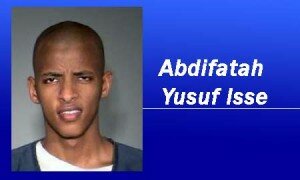 MINNEAPOLIS (AP) — Prosecutors portray a 25-year-old Minneapolis man accused of waging jihad in Somalia as a would-be terrorist who went so far as to help build a training camp.
MINNEAPOLIS (AP) — Prosecutors portray a 25-year-old Minneapolis man accused of waging jihad in Somalia as a would-be terrorist who went so far as to help build a training camp.
But family members of Abdifatah Yusuf Isse say the former college economics major never wanted to be a terrorist but got in over his head after he accepted a plane ticket to Somalia so he could visit his grandmother.
Isse and Salah Osman Ahmed, 26, are the first two men charged in a long-running federal investigation into the recruitment of Minnesota Somalis to join Islamist fighters in Somalia.
A grand jury indictment in February was unsealed this week after Ahmed was arrested. The court file, briefly sealed and then unsealed Wednesday without explanation, sheds some light on the case. In the last 18 months, up to 20 Twin Cities men of Somali descent have gone missing, and at least three have turned up dead in Somalia, according to their families.
Isse pleaded guilty in April to federal charges that he provided support to terrorists and has been cooperating with the FBI’s investigation, according to the court documents.
His attorney, Paul Engh, said in a June filing that Isse and other young Somalis were recruited at a house of worship to fight in Somalia. Prosecutors say Isse admitted that he trained with terrorists in Somalia and helped build a terrorist training camp.
Isse’s attorney didn’t return a phone call on Wednesday. Spokesmen for the FBI and the U.S. Attorney’s office declined to comment.
Omar Jamal, the executive director of the Minneapolis-based Somali Justice Advocacy Center, said Wednesday he was first approached by members of Isse’s family after they learned last winter that he was being held in federal detention after his arrest in February at the Seattle-Tacoma International Airport.
Jamal said he and Isse’s family members, who live in the Twin Cities and in Washington state, had little luck in getting information about the case.
“His court appearances were closed, federal marshals were all around posted outside the doors,” Jamal said. “It was all highly classified. To me, I was really shocked because I felt he fell through this black hole in the criminal justice system.”
Jamal said family members were eventually allowed to speak with Isse, who told them he had been approached by unidentified individuals at the Abubakar As-Saddique Islamic Center in Minneapolis who offered him money and a passport to travel to Somalia.
Prosecutors said in their court filing that it was only after he arrived in Somalia that Isse learned he was brought there to work with al-Shabaab, an Islamic terrorist group.
“He always wanted to visit his grandmother in Somalia, but he was broke, so when they offered him cash and a passport, he took it,” Jamal said. But after arriving in Somalia, Isse realized he was being closely watched and cooperated with the group until he could escape several weeks later, Jamal said.
Prosecutors said Isse spent “one to two weeks at the training camp” and then decided to leave with another person from Minnesota. Isse then visited family members in Somalia before returning to the U.S. in May 2008, their filing said. It appeared Isse had left the camp before the State Department in March designated al-Shabaab a foreign terrorist organization, it said.
Farhan Hurre, executive director Minneapolis Islamic center, didn’t return a phone call Wednesday. On Tuesday, he said he had no memory of Isse spending time at the popular mosque. He has insisted repeatedly that no one in a leadership position at the mosque had anything to do with the alleged recruiting efforts.
Isse spent time living in both Minneapolis and in Seattle, and from 2003 to 2007 he was enrolled as a student at Eastern Washington University near Spokane, where he majored in economics. He never graduated.
“He probably could have come to class a little more, but he did have career aspirations,” said Grant Forsyth, Isse’s academic advisor. “That makes him pretty similar to just about every male student at Eastern.”
Forsyth said Isse, who he remembered as “Abdi,” was interested in international economic development and talked about pursuing a master’s degree and perhaps seeking work at the U.N. He said Isse spoke about Somalia in only vague terms and never gave any indication of nationalist or religious fervor.
“When I heard about this, my mouth was just hanging open,” Forsyth said. “I can’t think of one thing that would have ever lead me to conclude this would be where Abdi would end up.”
Source: The Associated Press






